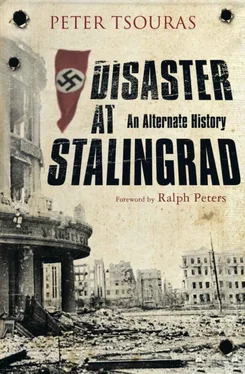Now they were back to their old tricks. Freedom of action be damned. It was only their way of giving themselves the leeway to fail and then blame it on him. His attitude to the professional army was becoming indistinguishable from what he had once told an acquaintance was the way to deal with the opposite sex. ‘When you go to a woman, take a whip.’ Now he would hold the whip over the Army’s generals.
‘I want no generalities, Jodl. Do you hear me? I want this plan in exacting detail.’ Jodl attempted to explain that senior commanders were traditionally given the initiative to plan their own methods. The look on his Führer’s face made Jodl instinctively take a step backwards.
Hitler snatched the plan out of Jodl’s hands and said, ‘I will deal with the matter myself,’ and stormed off, leaving the man shaken. 1
The conception of Operation Blau was Hitler’s. It was his child, and he now had to take it severely in hand after it had been spoiled into sickliness by the Army and Wehrmacht Operations staffs. He would make a man of it. It had the audacity and ambitious sweep of Barbarossa, but this time he would control it and force it to victory. He went to the map of the Soviet Union and swept his fingers across its south. Here, he said to himself, between the Donets and the Don, we will engage and destroy the bulk of the remaining Soviet field forces.
And all this was to be only the opening move to quench Germany’s insatiable thirst for oil. Hitler had been driven in so many of his schemes by an obsession with economic resources, and oil was above all his focus. Oil was vital not only for the Wehrmacht but for the very existence of modern Germany, and Germany had no oil. Its synthetic oil production could not come close to meeting demand, and Romanian oil could not either. The only remaining source within Hitler’s grasp was in the vast mountainous region of the Soviet Caucasus and Transcaucasus between the Black and Caspian Seas.
The two oilfields at Maikop in the Kuban east of the Black Sea and Grozny, capital of the Chechens, in the mountains produced about 10 per cent of all Soviet oil. South of the mountains in the Transcaucasus, however, lay the richest oilfields of all around the capital of Soviet Azerbaijan at Baku on the Caspian Sea. These fields produced 80 per cent of Stalin’s oil, about 24 million tons by 1942. 2Transcaucasia, which included the Soviet republics of Georgia, Armenia and Azerbaijan, was also the location of the richest manganese mines in the world, supplying the Soviet Union with 1.5 million tons annually, half of its needs.
The struggle between the Donets and Don was meant only to clear the way for the simultaneous thrust across the Caucasus to the oilfields of Baku on the coast of the Caspian and farther north to Astrakhan at the mouth of the Volga. Oil was what Germany and the Soviet Union both needed. With this stroke he would take it and at the same time deprive the enemy of it. As a bonus, the route for Allied supplies to the Russians from Persia would be severed at the moment when it seemed to be reaching the tonnage of aid sent by the Arctic convoys.
His imagination took flight as he dictated to his secretary ten single-spaced pages of minute directions for the upcoming offensive. As he finished he could see Stalin being dragged in a cage through the Brandenburg Gate to celebrate his triumph.
The Kremlin, Office of the General Secretary of the Communist Party of the USSR, 7 April 1942
Stalin had unconsciously divined Hitler’s plan for the summer offensive. All you had to do was look at the map. The wide open steppe that stretched from the Donets to the Volga and beyond fairly beckoned to a mechanized invader. Yes, it would be a drive to the south that the Germans would try, then across the mountains of the Caucasus. This region was rich in economic targets, and he knew of Hitler’s obsession with such booty. But then he made a further divination that obscured the spot-on accuracy of the first. He believed that, before heading south, Hitler would drive on Moscow for the decisive battle to take the ancient Russian capital. Only then, Stalin concluded, would he turn to the Caucasus. He did not know that, two days before, Hitler had issued Führer Directive No. 41, that ordered just such an attack to the south as the primary German effort for 1942.
The directive was based on the conclusion that the ‘enemy in his anxiety to exploit what seemed like initial successes has spent during the winter the bulk of his reserves earmarked for future operations.’ 3The Stavka, or command element of the armed forces of the Soviet Union, 4had indeed accumulated eleven new reserve armies as a strategic reserve. Georgi Zhukov, the most brilliant and successful of Stalin’s generals, urged him to concentrate that force to destroy the German Army Group Centre. Instead, Stalin distributed them across five fronts for the defence of Moscow. 5The Germans had done their best to make Stalin’s wish father to that thought. They had conducted numerous reconnaissance missions over Moscow and left detailed city maps to be captured by Soviet patrols. It was all Stalin needed to continue to deceive himself. It was a remarkable achievement in self-deception in the face of the accurate intelligence to the contrary from a number of highly placed Soviet agents of proven veracity.
Hitler’s directive instead stated that the centre of the front was to be held on the defensive ‘while all available forces are concentrated for the main operation in the southern sector, with the objective of annihilating the enemy on the Don and subsequently gaining the oilfields of the Caucasian region and the crossing of the Caucasus itself.’ 6Hitler’s emphasis at this point was clearly on securing the oil of the Caucasus. He said plainly, ‘If we don’t secure Maikop and Grozny, then I must put an end to the war.’ The city of Stalingrad on the Volga did not loom at all in the scale of things for Hitler. Its only importance was as a war armaments centre and Volga crossing, both of which would be lost to the Soviets if the city were simply bypassed. 7
The Wolfssehanze, 13 April 1942
‘Yes!’ said Hitler has he took off his spectacles. ‘This is just the sort of analysis I need.’ He then read it out loud to the officers assembled at the Führer Naval Conference.
In their endeavour to support Soviet Russia, Great Britain and the United States will make every effort during the coming weeks and months to increase shipment of equipment, materiel, and troops to Russia as much as possible. In particular the supplies reaching Russia on the Basra-Iran route will go to the Russian Caucasus and southern fronts. All British or American war materiel which reaches Russia by way of the Near East and the Caucasus is extremely disadvantageous to our land offensive. Every ton of supplies which the enemy manages to get through to the Near East means a continuous reinforcement of the enemy war potential, makes our own operations in the Caucasus more difficult, and strengthens the British position in the Near East and Egypt. 8
Hitler’s summation was simple, ‘This reads like an annex to my Directive 41. I congratulate the naval staff. Its conclusions fully support that directive.’ 9
He had every reason to give praise. By midsummer of 1941, it had become apparent to both Moscow and London that the Germans were thrusting towards the Caucasus. The British and Russians jointly occupied Iran in August, ousted the pro-Axis shah, and began to prepare the ports, oilfields, railways and roads to receive supplies and equipment. After Pearl Harbor large numbers of American troops began arriving to serve in auxiliary capacities for the British as American ships began to reach Persian Gulf ports. From January to April 45,000 tons of cargo originating from the USA and Canada had been transferred to the Soviets. Britain contributed another 2,500 tons. In May alone the tonnage was expected to double, almost equalling the tonnage sent by one Arctic convoy. The first American Douglas A-20 Havoc light bomber was flown into Persia in February. By April another 38 had arrived with monthly deliveries of about a hundred a month scheduled. The Americans built a truck assembly plant which began work in April and was scheduled to assemble almost 400 that month and over a thousand a month thereafter. 10The Persian Corridor was beginning to swell with cargoes headed for the Soviet Union just as Hitler had determined that that door to the Caucasus must be slammed shut.
Читать дальше












